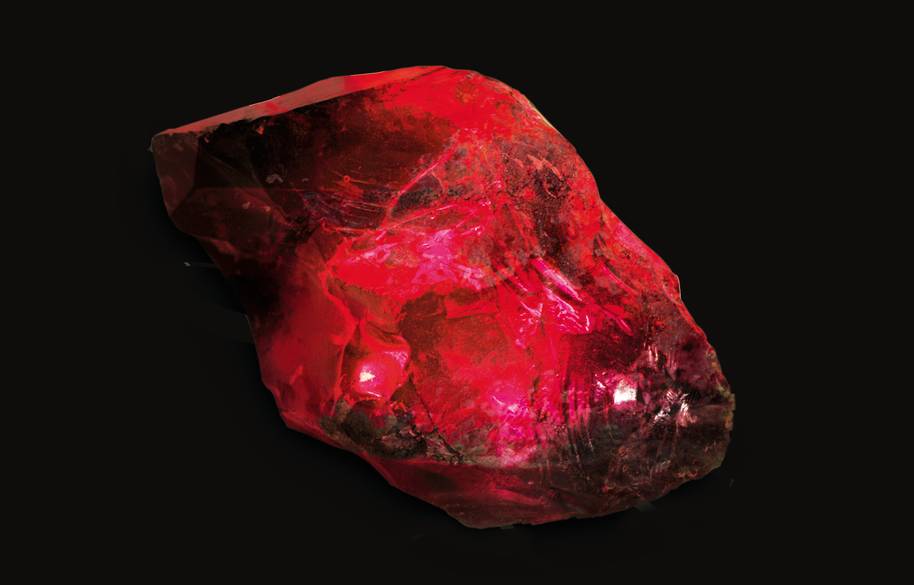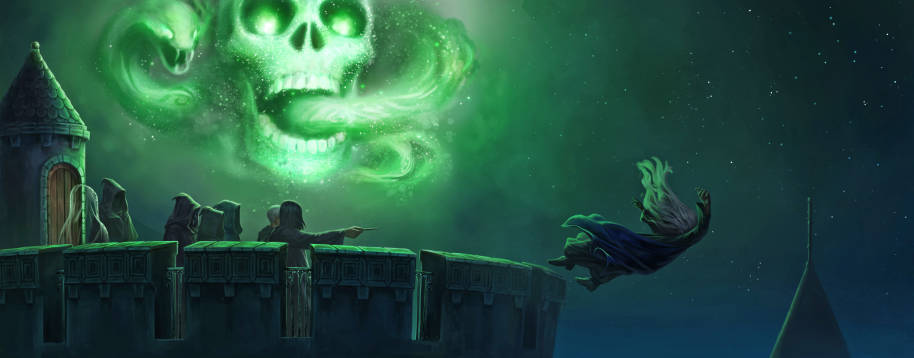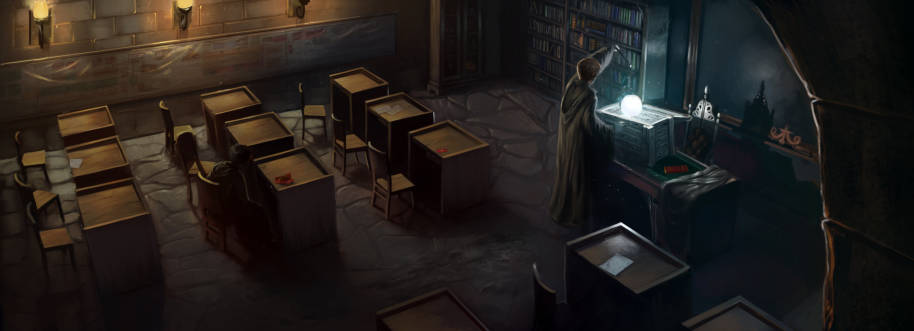In choosing to rank the lessons of Hogwarts we’ve had to be strict with ourselves and apply some criteria, otherwise we could literally be arguing about this forever. These criteria are: 1) how much the subject was enjoyed by Harry, Ron and Hermione; 2) how useful it was in the exploits of them and their peers, and 3) how good/entertaining the teachers were.
Let’s begin.
Alchemy
According to J.K. Rowling, she imagined that this ancient, specialised subject would've been taught to Hogwarts students in their later years. Nicolas Flamel would have been a fan of Alchemy, certainly, seeing as this is the practise that led to the inception of the Philosopher’s Stone. But as great as Philosopher’s Stones sound, the study of Alchemy sounds like a lot of hard graft.

Arithmancy
‘Arithmancy looks terrible,’ said Harry, picking up a very complicated-looking number chart. ‘Oh, no, it’s wonderful!’ said Hermione earnestly. ‘It’s my favourite subject! It’s –‘
Harry Potter and the Prisoner of Azkaban
Arithmancy was a subject that Hermione enjoyed: ‘it’s probably the toughest subject there is!’ Presided over by the witch Professor Vector, we don’t learn a huge amount about this lesson, other than it is somewhere Hermione needs to dash off to, and that she was known to use the textbook as a pillow.
It probably helped Hermione’s already ruthlessly logical brain. It was also one of the necessary subjects to become a Curse-Breaker at Gringotts Wizarding Bank, if the banking sector was your desired career path.

Muggle Studies
‘People say Muggle Studies is a soft option, but I personally think wizards should have a thorough understanding of the non-magical community, particularly if they’re thinking of working in close contact with them – look at my father, he has to deal with Muggle business all the time.
Percy Weasley – Harry Potter and the Chamber of Secrets
Hermione dropped Muggle Studies after passing her exam in their third year with a result of 320%. But since she was only able to do it with the help of a Time-Turner, we’re not surprised she wanted to jack it in, in the end.
We reckon Ron might have a point here. Would you really want to study Muggles over magic? Perhaps if you were an inquisitive witch or wizard, it would be different.

History of Magic
Easily the most boring lesson was History of Magic, which was the only class taught by a ghost.
Harry Potter and the Philosopher’s Stone
The ‘dullest subject’ at Hogwarts was not helped by the fact that it was taught by Professor Binns, someone who had actually died but still continued to relentlessly teach the subject as a ghost.
The set text, A History of Magic by Batilda Bagshot, was useful though: it meant that Hermione was able to make a crucial connection between Godric’s Hollow and the sword of Gryffindor. That in turn led to a visit to Bagshot’s house, which as we know, took a turn for the unexpected.

Astronomy
They had to study the night skies through their telescopes every Wednesday at midnight and learn the names of different stars and the movements of the planets.
Harry Potter and the Philosopher’s Stone
Taught by Professor Sinistra, Astronomy is important to us readers for understanding the association of some character names, but in the series it was one of the least useful subjects. That said, the Astronomy Tower provided a good vantage point to see Umbridge’s attempt to restrain Hagrid in the middle of the night, during an exam no less!

Study of Ancient Runes
They hurried back down to the Gryffindor common room, which was half-empty, and joined Hermione, who was sitting alone, reading a book called Ancient Runes Made Easy.
Harry Potter and the Chamber of Secrets
Another Hermione specialism, even though she was positive she ‘messed up’ the Ancient Runes exam in Half-Blood Prince, Runes is one of the other more esoteric subjects at Hogwarts.
But it really came into its own when deciphering The Tales of Beedle the Bard, which was bequeathed to Hermione in Dumbledore’s will. In the end, knowing runes meant that Hermione was able to unlock some of the most important history of the wizarding world.

Divination
‘My name is Professor Trelawney. You may not have seen me before. I find that descending too often into the hustle and bustle of the main school clouds my Inner Eye.’
Professor Sybil Trelawney, Harry Potter and the Prisoner of Azkaban
If you really, really enjoyed drinking tea, Divination might have come out top. Its biggest problem was its teacher. Why? Professor Sybill Trelawney never shook the impression she initially gave of being a fraud. Peering into crystal balls felt like an infuriating waste of time to some, and informing Harry that he had the shortest life-lines she had ever seen didn’t help to get him onside either.
Trelawney had an annoying habit of repeatedly predicting Harry’s death as well. Her rather self-aggrandising but vague approach to teaching made lessons a chore and often a bore. She was replaced by Firenze the centaur, who was as elusive in his own way. As for that tea, it just looked like a ‘load of soggy brown stuff’ to Harry. Unfogging the future was a source of more anxiety than illumination.

Transfiguration
‘Transfiguration is some of the most complex and dangerous magic you will learn at Hogwarts,’ she said. ‘Anyone messing around in my class will leave and not come back. You have been warned.’ Then she changed her desk into a pig and back again.
Professor McGonagall – Harry Potter and the Philosopher’s Stone
Once you got your copy of A Beginner’s Guide to Transfiguration by Emeric Switch, you understood that Transfiguration was more demanding and scientific than many of the other subjects – roughly speaking, the larger the object or being you wanted to transform, the harder work it was. Presided over by the strict and no-nonsense Professor McGonagall, the subject covered everything from Switching Spells to Vanishment.
But Transfiguration, once mastered, opens up a realm of opportunities. From objects to human beings, anything seems to be possible, as long as you know your stuff properly. Never forget the time Viktor Krum Transfigured his head into a shark...

Herbology
‘Oh, hello there!’ Lockhart called, beaming around at the assembled students. ‘Just been showing Professor Sprout the right way to doctor a Whomping Willow! But I don’t want you running away with the idea that I’m better at Herbology than she is! I just happen to have met several of these exotic plants on my travels . . .’
Harry Potter and the Chamber of Secrets
Herbology, which you might assume would be pretty sedate – watering and tending plants, what could be more difficult? – was actually quite high-stress, with its screaming Mandrakes and nipping Fanged Geraniums. Plants had an important role in the stories, not least the Gillyweed which Harry used to breathe underwater during the Triwizard Tournament.

And everyone knows you can’t make a Draught of Peace without hellebore, or Polyjuice Potion without knotgrass and fluxweed! Okay, maybe not everyone knows that. Anyway, Herbology had a bearing on some of Harry and co.’s key decisions and biggest mistakes. And remembering that Devil's Snare doesn't like the dark and the damp ended up being pretty handy...
Care of Magical Creatures
‘Eurgh’ just about summed up the Blast-Ended Skrewts, in Harry’s opinion. They looked like deformed, shell-less lobsters, horribly pale and slimy-looking, with legs sticking out in very odd places and no visible heads.
Harry Potter and the Goblet of Fire
Magical creatures are all over the Harry Potter stories. Though Hagrid wasn’t the most safety conscious teacher, his love of animals great, small, or blast-ended, helped Harry, Ron and Hermione through a variety of hair-raising encounters.
Hagrid’s love of Aragog wasn’t reciprocated by Ron, Hermione worried that the ferocity of the Hippogriffs might cost Hagrid his job, and Harry had to reconcile himself to the reason why he could see Thestrals, but though it was a struggle, the creatures all had a massive influence on their fate. Some more than others, take dragons – Harry had to contend with a Hungarian Horntail in the first task of the Triwizard Tournament, but it was a Ukrainian Ironbelly which blasted them out of Gringotts in Deathly Hallows.
But sometimes it was much nicer - such as the study of unicorns and Nifflers. Or failing that: Flobberworms.

Potions
The next two days passed without great incident, unless you counted Neville melting his sixth cauldron in Potions.
Harry Potter and the Goblet of Fire
In the early years, the Potions classroom was something of a battleground for Harry and his friends, versus Professor Snape. It wasn’t much fun, to be honest, but by the time that Slughorn took over in the sixth year, all that aggravation in the form of melted cauldrons and the outbreak of boils, was worth it.
Amortentia and Felix Felicis alone were worth enduring years of Snape’s ridicule. And that’s before you get to the spells he scrawled in the margins of Advanced Potion-Making, from the brutal Sectumsempra to the slightly more comical (and useful) Levicorpus that Harry inadvertently tested out on Ron. Sorry, Ron!

Flying lessons
‘Typical,’ said Harry darkly. ‘Just what I always wanted. To make a fool of myself on a broomstick in front of Malfoy.’ He had been looking forward to learning to fly more than anything else.
Harry Potter and the Philosopher’s Stone
Bit of a curve-ball (rather than a Quaffle...) perhaps, but what would a Hogwarts student be without flying lessons?! Pretty bored. And flying a broomstick seriously had its uses: numerous Quidditch matches, the first task of the Triwizard Tournament, the flight of the seven Potters… It goes on and on, and it was fun. Hermione may disagree, however.

Charms
Harry picked the shining, silvery cloth off the floor. It was strange to the touch, like water woven into material. ‘It’s an Invisibility Cloak,” said Ron, a look of awe on his face. “I’m sure it is — try it on.’
Harry Potter and the Philosopher’s Stone
Harry Potter simply wouldn’t be Harry Potter without spells and charms. Indeed, Harry's mother Lily was also known to be talented in this area. From tooth-shrinking to Wingardium Leviosa – under Professor Flitwick’s guidance, this subject taught pupils the very fabric of the wizarding world. And Wingardium Leviosa helped Harry, Ron and Hermione not get obliterated by a giant troll in their very first year, let's not forget. And this was one of many vital charms that helped guide Harry's adventures.
Think about the importance of charmed objects too: the invisibility cloak, broomsticks, the entrance to Diagon Alley, it goes on and on. Without Charms, the wizarding world just would not be… wizarding.
Defence Against the Dark Arts
‘Avada Kedavra!’ Moody roared. There was a flash of blinding green light and a rushing sound, as though a vast, invisible something was soaring through the air — instantaneously the spider rolled over onto its back, unmarked, but unmistakably dead.
Harry Potter and the Goblet of Fire
It’s a close-run thing between Charms and Defence Against the Dark Arts for the top spot, but DADA pips it to the post. OK, it did not have the most stable pupil-teacher dynamic, but a new teacher each year was exciting… to begin with. When they were very good, in the case of Professor Lupin, they were undoubtedly life-changing, and when they were very bad (Quirrell, Carrow, Umbridge!) the lesson in effect taught itself.

The spells learnt in the class such as the Stunning Spell or Riddikulus offered essential protection, as much as the Cruciatus Curse and Killing Curse were vicious and to be used with the utmost discretion. This is before you learn about all the Dark creatures, from Boggarts to Dementors. The real test of the success of a subject is how keenly students practice it outside the classroom, and when Umbridge deprived her charges of practical learning in the classroom, Harry and friends were more than happy to form Dumbledore’s Army and teach themselves, as well as resist an increasingly oppressive school regime.
A subject that preserved the integrity of the school in the face of its administration, is a worthy no.1 in our minds!


